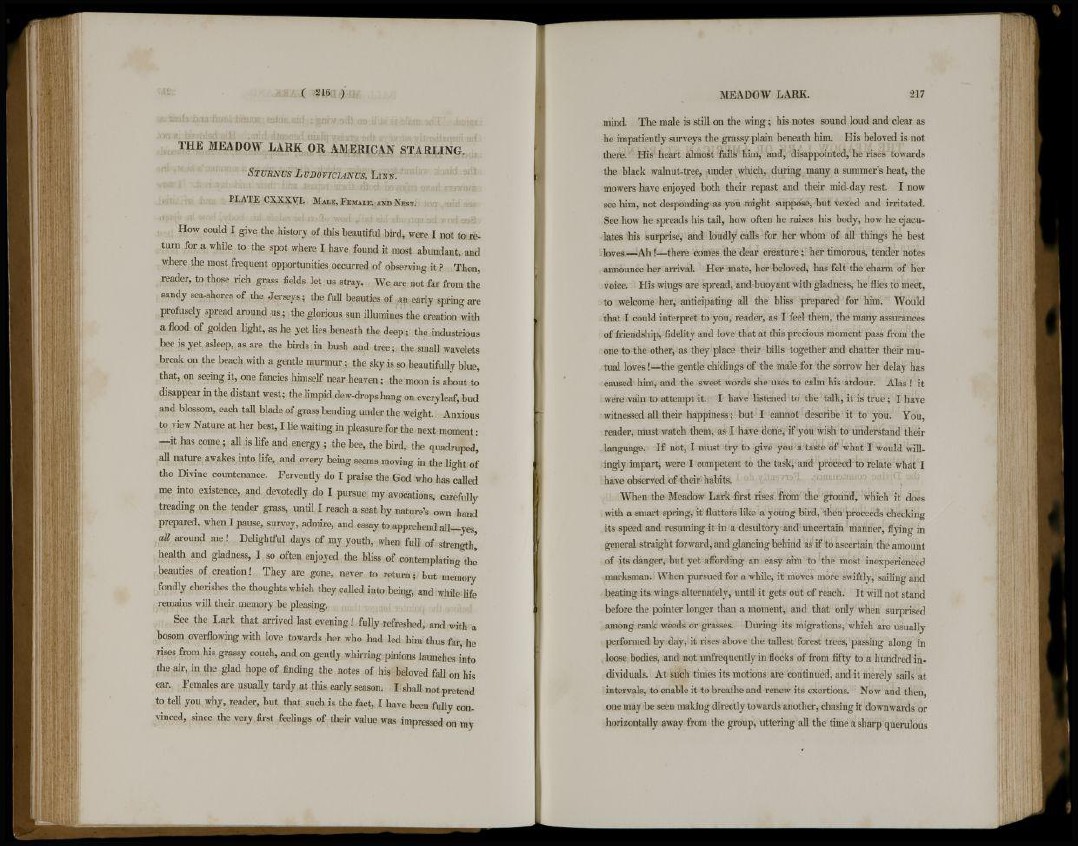
THE MEADOW LARK OR AMERICAN STARLING.
STURNUS LUDOVICIANUS, LINN.
P L A T E C X X X V I . MALE, FEMALE, AND NEST.
How could I give the history of this beautiful bird, were I not to return
for a while to the spot where I have found it most abundant, and
where the most frequent opportunities occurred of observing it ? Then,
reader, to those rich grass fields let us stray. We are not far from the
sandy sea-shores of the Jerseys; the full beauties of an early spring are
profusely spread around us; the glorious sun illumines the creation with
a flood of golden light, as he yet lies beneath the deep; the industrious
bee is yet asleep, as are the birds in bush and tree; the small wavelets
break on the beach with a gentle murmur; the sky is so beautifully blue,
that, on seeing it, one fancies himself near heaven ; the moon is about to
disappear in the distant west; the limpid dew-drops hang on every leaf, bud
and blossom, each tall blade of grass bending under the weight. Anxious
to view Nature at her best, I he waiting in pleasure for the next moment:
—it has come ; all is life and energy ; the bee, the bird, the quadruped,
all nature awakes into life, and every being seems moving in the light of
the Divine countenance. Fervently do I praise the God who has called
me into existence, and devotedly do I pursue my avocations, carefully
treading on the tender grass, until I reach a seat by nature's own hand
prepared, when I pause, survey, admire, and essay to apprehend all—yes,
all around me ! Delightful days of my youth, when full of strength,
health and gladness, I so often enjoyed the bliss of contemplating the
beauties of creation! They are gone, never to return; but memory
fondly cherishes the thoughts which they called into being, and while life
remains will their memory be pleasing.
See the Lark that arrived last evening! fully refreshed, and with a
bosom overflowing with love towards her who had led him thus far, he
rises from his grassy couch, and on gently whirring pinions launches into
the air, in the glad hope of finding the notes of his beloved fall on his
ear. Females are usually tardy at this early season. I shall not pretend
to tell you why, reader, but that such is the fact, I have been fully convinced,
.since the very first feelings of their value was impressed on my
mind. The male is still on the wing ; his notes sound loud and clear as
he impatiently surveys the grassy plain beneath him. His beloved is not
there. His heart almost fails him, and, disappointed, he rises towards
the black walnut-tree, under which, during many a summer's heat, the
mowers have enjoyed both their repast and their mid-day rest. I now
see him, not desponding as you might suppose, but vexed and irritated.
See how he spreads his tail, how often he raises his body, how he ejaculates
his surprise, and loudly calls for her whom of all things he best
loves.—Ah !—there comes the dear creature; her timorous, tender notes
announce her arrival. Her mate, her beloved, has felt the charm of her
voice. His wings are spread, and buoyant with gladness, he flies to meet,
to welcome her, anticipating all the bliss prepared for him. Would
that I could interpret to you, reader, as I feel them, the many assurances
of friendship, fidelity and love that at this precious moment pass from the
one to the other, as they place their bills together and chatter their mutual
loves!—the gentle eludings of the male for the sorrow her delay has
caused him, and the sweet words she uses to calm his ardour. Alas ! it
were vain to attempt it. I have listened to the talk, it is true ; I have
witnessed all their happiness; but I cannot describe it to you. You,
reader, must watch them, as I have done, if you wish to understand their
language. If not, I must try to give you a taste of what I would willingly
impart, were I competent to the task, and proceed to relate what I
have observed of their habits.
When the Meadow Lark first rises from the ground, which it does
with a smart spring, it flutters like a young bird, then proceeds checking
its speed and resuming it in a desultory and uncertain manner, flying in
general straight forward, and glancing behind as if to ascertain the amount
of its danger, but yet affording an easy aim to the most inexperienced
marksman. When pursued for a while, it moves more swiftly, sailing and
beating its wings alternately, until it gets out of reach. It will not stand
before the pointer longer than a moment, and that only when surprised
among rank weeds or grasses. During its migrations, which are usually
performed by day, it rises above the tallest forest trees, passing along in
loose bodies, and not unfrequently in flocks of from fifty to a hundred individuals.
At such times its motions are continued, and it merely sails at
intervals, to enable it to breathe and renew its exertions. Now and then,
one may be seen making directly towards another, chasing it downwards or
horizontally away from the group, uttering all the time a sharp querulous